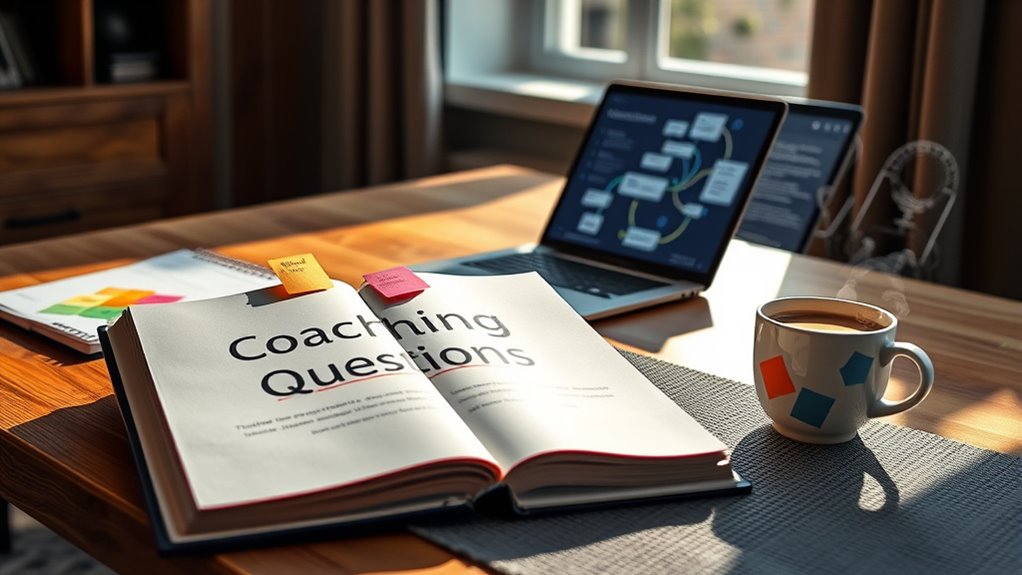If you’re looking for the best books to enhance your coaching questions and transform your conversations, I recommend exploring a mix of all-encompassing guides, practical toolsets, and foundational skills. Titles like *”555 Powerful Questions,”* *”1500 Coaching Questions,”* and *”The Coaching Habit”* stand out for their diverse scenarios and actionable tips. Whether you’re a beginner or experienced coach, these resources will sharpen your skills and deepen your conversations—if you keep exploring, you’ll discover even more ways to elevate your coaching practice.
Key Takeaways
- The list includes comprehensive resources like “555 Powerful Questions” and “1500 Coaching Questions” for diverse coaching needs.
- It features focused guides such as “Powerful Questions in Coaching” and “Developing Coaching Skills” for foundational and practical skills.
- Practical application books like “The Coaching Habit” and “Make It Happen” emphasize impactful questioning techniques.
- Resources cater to various experience levels, from beginners to advanced coaches, ensuring tailored skill development.
- Emphasis is placed on cultural sensitivity, inclusivity, and aligning questions with specific coaching goals and client needs.
555 Powerful Questions for Leadership, Coaching, and Mentoring
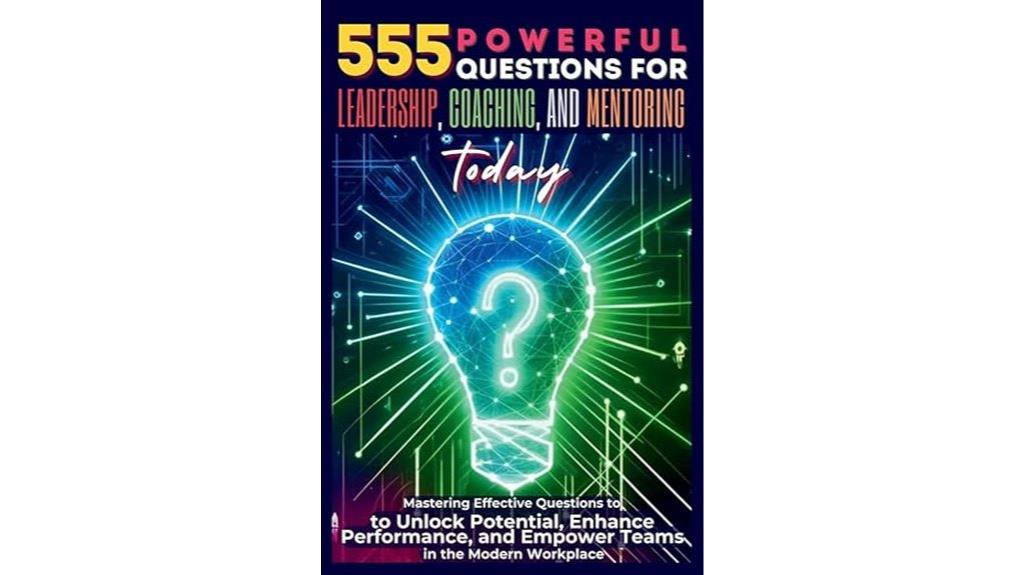
Are you looking for a resource that empowers leaders, coaches, and mentors to ask meaningful questions that spark growth and connection? “555 Powerful Questions for Leadership, Coaching, and Mentoring Today” offers exactly that. This all-encompassing guide helps you unlock potential, improve performance, and foster stronger relationships. It covers essential topics like accountability, creativity, and human connection, with tailored prompts for 35 leadership styles. Plus, the bonus of 111 follow-up questions deepens conversations and clarifies responses. I’ve found it invaluable for transforming interactions, making them more insightful and impactful. If you want to elevate your leadership conversations, this book is a must-have.
Best For: leaders, coaches, and mentors seeking to enhance their questioning skills to foster growth, accountability, and human connection within diverse teams.
Pros:
- Provides 555 thoughtfully crafted questions across multiple leadership styles and topics.
- Includes a bonus of 111 follow-up questions that deepen discussions and clarify responses.
- Enhances team engagement, collaboration, and understanding through meaningful conversations.
Cons:
- Some users report issues with the quality of binding, such as pages falling out.
- The extensive number of questions may be overwhelming for some users to navigate without guidance.
- As a comprehensive resource, it may require time and practice to integrate effectively into daily leadership interactions.
Powerful Questions in Coaching, Mentoring, and Leading at Work
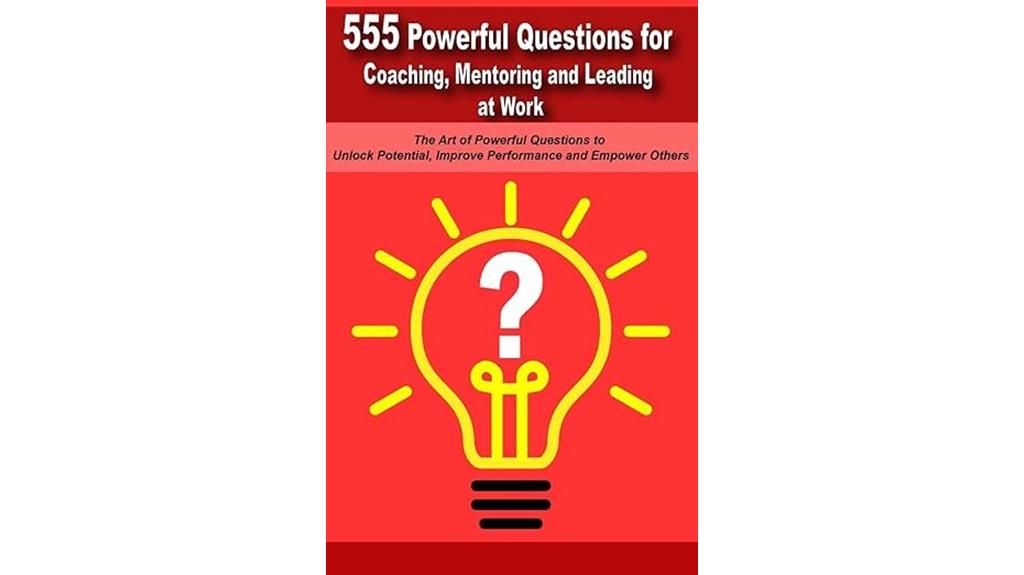
If you’re a coach, mentor, or leader looking to elevate your conversations, “Powerful Questions in Coaching, Mentoring, and Leading at Work” offers practical tools to do just that. This book highlights the power of asking impactful, open-ended questions tailored to specific situations. It emphasizes that short, simple questions often yield the most insightful responses, making them easy to incorporate into any interaction. Users report applying these questions to foster self-awareness, reflection, and growth in their teams. Its clear, organized format makes it a valuable resource for guiding meaningful dialogues, empowering others, and enhancing your leadership effectiveness in a professional setting.
Best For: coaches, mentors, and leaders seeking practical, impactful questions to enhance conversations, foster self-awareness, and promote growth in professional and personal settings.
Pros:
- Provides a curated collection of short, simple, and effective questions suitable for various scenarios.
- Enhances self-awareness, reflection, and empowerment in both leaders and teams.
- Well-organized and easy to incorporate into coaching, mentoring, and leadership practices.
Cons:
- Some users find the book to be quite concise, wishing for more in-depth content.
- May require practice and adaptation to fully integrate questions into different contexts.
- Primarily focuses on professional settings, which might limit applicability for personal or informal situations.
Coaching Questions: A Coachs Guide to Powerful Asking Skills
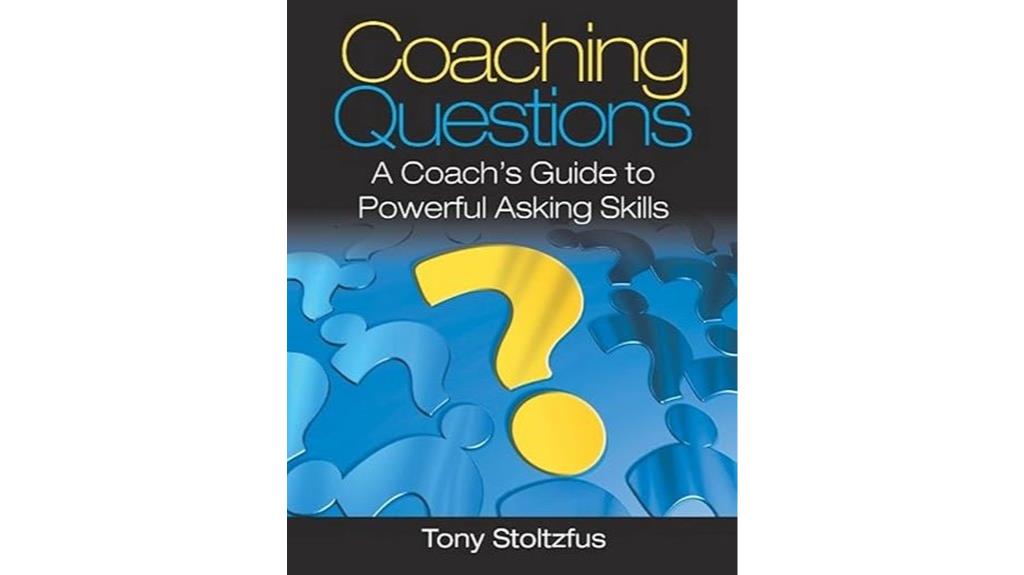
Coaching Questions: A Coach’s Guide to Powerful Asking Skills stands out as an essential resource for both new and experienced coaches enthusiastic to sharpen their questioning techniques. I find it invaluable for understanding why asking the right questions matters—helping clients discover answers within themselves, boosting confidence, and encouraging authentic growth. The book covers foundational coaching concepts, effective models, and targeted questions for different stages and niches. It also offers advanced skills for deeper inquiry and active listening. Practical and well-structured, it’s perfect for quick reference and improving session impact, making it a must-have for anyone serious about transforming conversations through powerful questioning.
Best For: coaching professionals, both new and experienced, seeking practical guidance to enhance their questioning skills and improve session effectiveness.
Pros:
- Highly practical with well-structured content and categorized questions for quick reference
- Covers foundational concepts, advanced inquiry techniques, and application tips for comprehensive skill development
- Suitable for a range of coaching niches and experience levels, making it versatile and accessible
Cons:
- May require additional resources for in-depth mastery of coaching models and techniques
- Some users might find the focus primarily on question-based skills less comprehensive for broader coaching strategies
- As a printed guide, it may lack interactive or digital features for on-the-go reference
The Coaching Habit: Say Less, Ask More, and Change the Way You Lead Forever
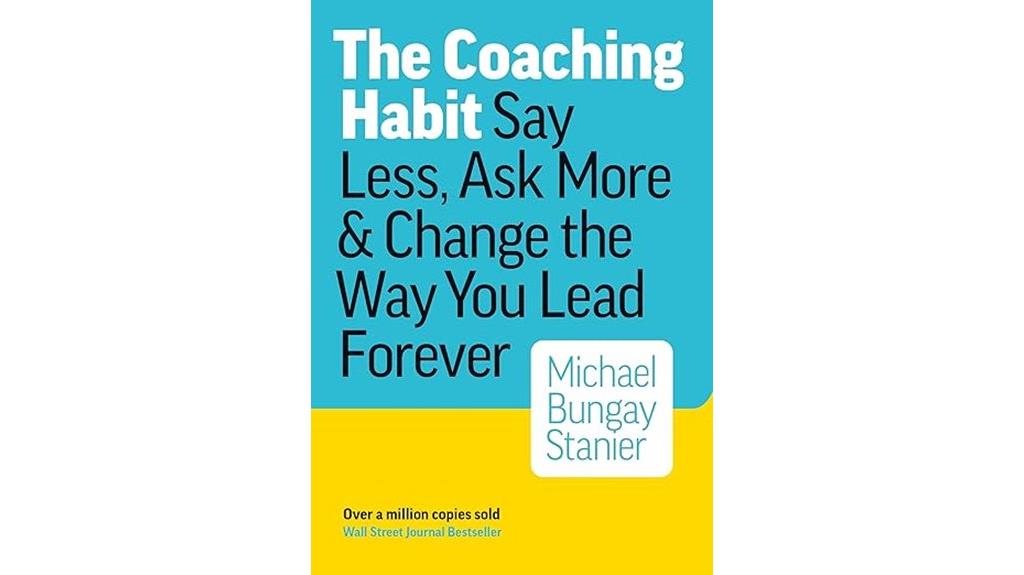
The Coaching Habit by Michael Bungay Stanier stands out as an essential resource for managers who want to integrate coaching into their daily leadership practices. It emphasizes asking fewer, more impactful questions instead of giving advice or instructions. Designed for both newcomers and experienced leaders, the book offers practical guidance on developing a coaching habit through seven key questions. I appreciate its straightforward approach, making coaching natural rather than formal. The focus on active listening and everyday conversations helps me foster more meaningful, self-reflective dialogues with my team. It’s a powerful, easy-to-implement tool to transform leadership and communication effectively.
Best For: Managers and leaders seeking to incorporate simple, effective coaching techniques into their daily interactions to enhance team performance and engagement.
Pros:
- Provides practical, easy-to-apply questions that foster self-reflection and problem-solving.
- Emphasizes developing a coaching habit that feels natural and integrated into everyday conversations.
- Suitable for both beginners and experienced leaders, with a clear, engaging writing style.
Cons:
- Lacks detailed strategies for handling complex issues like the Drama Triangle or difficult personalities.
- Focuses primarily on conversational coaching, with limited guidance on formal coaching structures.
- Some readers may find the seven questions too simplified for certain nuanced leadership challenges.
1500 Coaching Questions
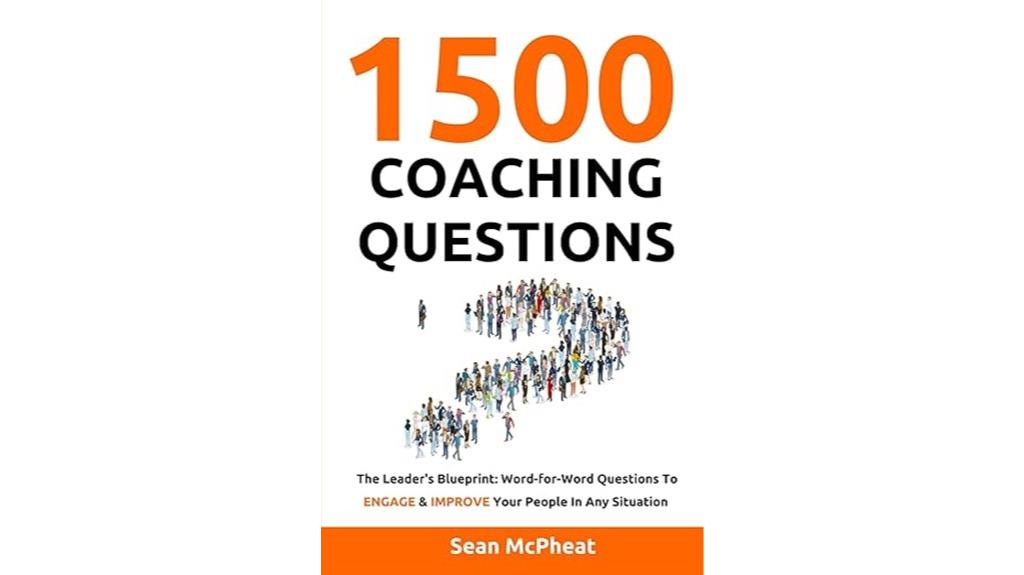
Are you looking for a practical and all-encompassing resource to elevate your questioning techniques? “1500 Coaching Questions” by Sean McPheat stands out as an ideal choice for leaders, managers, and coaches enthusiastic to improve their interpersonal skills. This book offers a vast collection of adaptable questions tailored for various scenarios, making it easy to prepare for meetings, foster engagement, and refine coaching methods. Its well-organized structure allows quick access to relevant questions, saving time and effort. Users report immediate improvements in their coaching approach, leadership growth, and communication effectiveness—making it a valuable tool for ongoing professional development.
Best For: leaders, managers, and coaches seeking a comprehensive and practical resource to enhance their questioning techniques and coaching effectiveness.
Pros:
- Offers a vast collection of 1500 adaptable questions for diverse scenarios.
- Well-organized structure allows quick access, saving time and effort.
- Immediate impact on coaching approach, leadership growth, and communication skills.
Cons:
- May be overwhelming for those new to coaching due to the volume of questions.
- Some users might find it less effective without contextual guidance or examples.
- The extensive content could require dedicated time to fully utilize and integrate into practice.
Coaching Questions for Every Situation
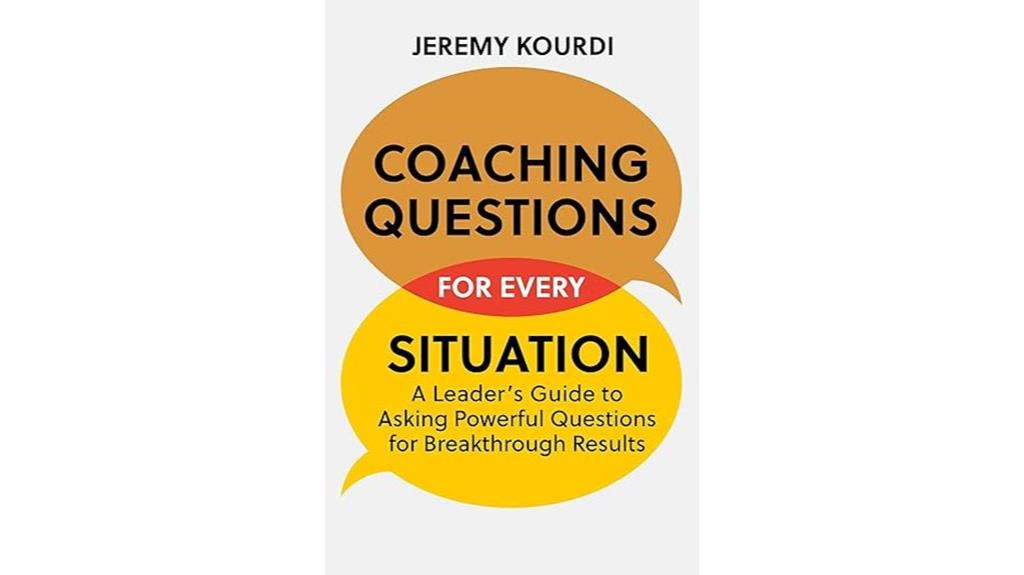
If you’re a coach looking to expand your toolkit with versatile questions for any situation, “Coaching Questions for Every Situation” stands out as an especially valuable resource. It offers a broad range of practical questions tailored to various coaching scenarios, helping you improve session effectiveness and client engagement. While some questions are repeated, the book’s accessible language and all-encompassing scope make it ideal for both beginners and experienced coaches. It’s a useful reference for diversifying your questioning techniques and developing your coaching skills across diverse contexts. I plan to revisit it regularly to keep my practice fresh and effective.
Best For: coaches at all experience levels seeking a comprehensive, practical resource to diversify their questioning techniques across various coaching scenarios.
Pros:
- Offers a wide range of versatile questions applicable to many coaching situations
- Accessible language makes it easy for beginners to understand and implement
- Helps improve session effectiveness and client engagement through practical ideas
Cons:
- Contains some redundant questions, which can affect the reading experience
- May be less suitable for advanced coaches seeking highly specialized techniques
- Slightly limited in depth compared to more comprehensive, specialized coaching books
Make It Happen Coaching Strategies for Instructional Coaches
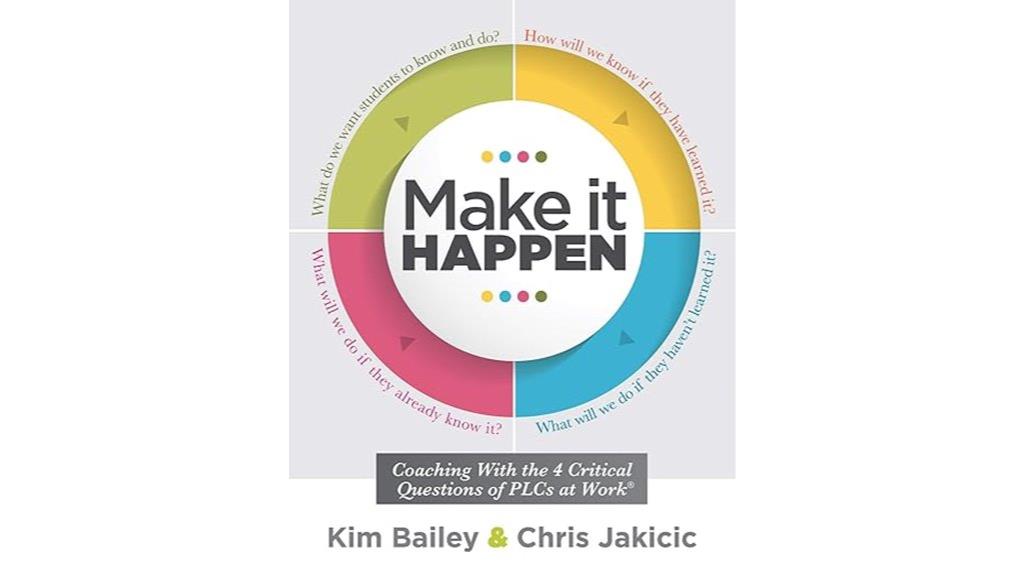
Make It Happen Coaching Strategies for Instructional Coaches stands out as an essential resource for coaches aiming to elevate their effectiveness within Professional Learning Communities (PLCs). I find this book invaluable because it offers practical guidance and creative ideas to boost teacher efficacy and strengthen PLCs. The reproducible materials and strategic coaching techniques help me make a real difference in my school’s collaborative culture. Whether you’re new or experienced, the actionable strategies empower you to foster continuous improvement and increase student achievement. I highly recommend it for coaches committed to transforming conversations and driving impactful change in their schools.
Best For: instructional coaches and educators seeking practical strategies to enhance PLC effectiveness, improve teacher collaboration, and increase student achievement.
Pros:
- Provides actionable coaching strategies tailored for PLCs and instructional improvement
- Includes reproducible materials that facilitate implementation and impact
- Supports both new and experienced coaches in fostering continuous school improvement
Cons:
- May require adaptation for specific school contexts or cultures
- Some strategies might need supplemental training for full effectiveness
- The focus is primarily on coaching within PLCs, which may limit applicability outside that setting
Developing Coaching Skills: A Concise Introduction
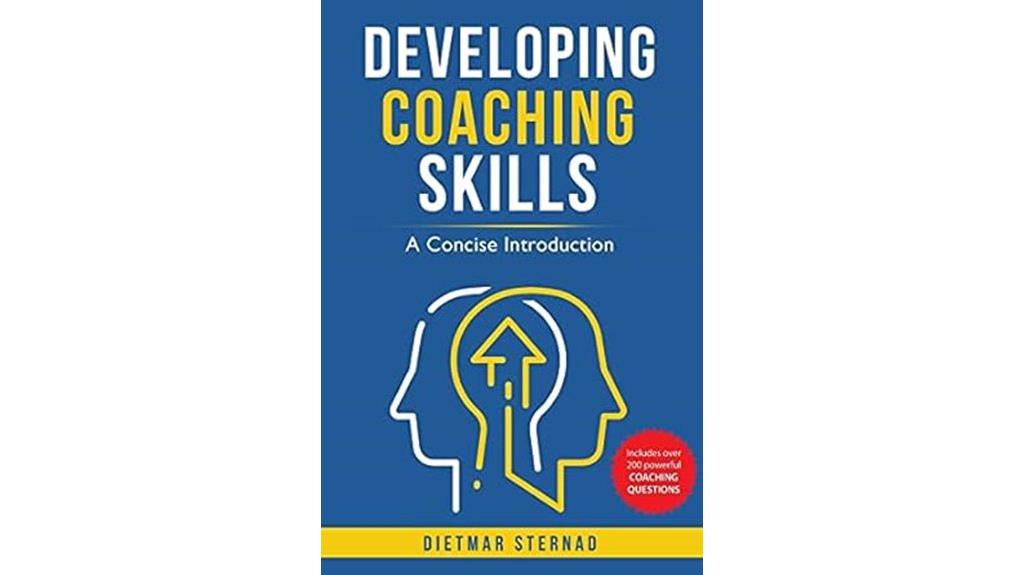
Developing coaching skills is essential for anyone looking to enhance their ability to guide others effectively, whether you’re a beginner, manager, or entrepreneur. This concise introduction covers core coaching functions, essential skills, and practical tools like questions, case studies, and exercises. It’s designed to help you tap into potential, foster self-discovery, and improve your questioning and listening abilities. Suitable for all levels, it emphasizes coaching as a powerful way to inspire leadership, develop relationships, and support growth. With its clear structure and practical resources, this guide makes mastering coaching concepts quick and accessible, empowering you to transform your conversations confidently.
Best For: Beginners, managers, entrepreneurs, and professionals seeking a quick, practical introduction to coaching skills for personal development and effective leadership.
Pros:
- Provides clear, concise, and easy-to-understand coaching concepts suitable for all levels
- Includes practical exercises, questions, case studies, and tools to facilitate rapid learning
- Well-structured and human-centered approach that enhances communication, listening, and questioning skills
Cons:
- May lack in-depth theoretical coverage for advanced coaching practitioners
- Focused on foundational skills, possibly requiring additional resources for specialized coaching areas
- As a concise introduction, some complex coaching topics might not be explored in detail
Powerful Questions in Coaching, Mentoring and Leading at Work
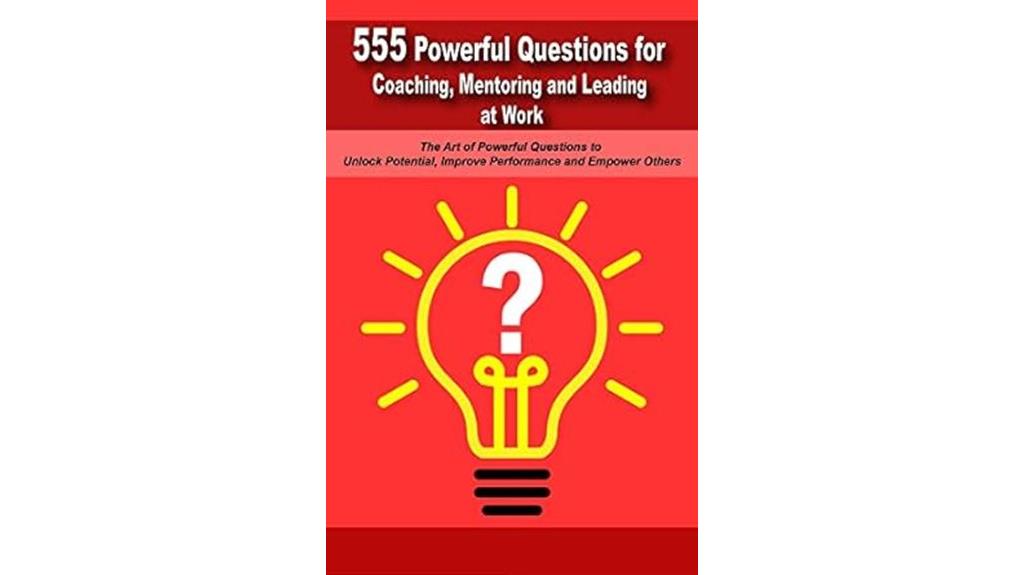
Are you a coach, mentor, or leader seeking to elevate your conversations and open deeper insights? *Powerful Questions in Coaching, Mentoring, and Leading at Work* is an invaluable resource designed specifically for professionals who want to harness the power of simple yet impactful questions. It emphasizes that short, clear questions can uncover potential, boost self-awareness, and foster growth. Organized by topics, it offers practical, thought-provoking inquiries tailored for various situations. Many users find these questions enhance coaching sessions, resolve conflicts, and promote reflection. This book is a practical, concise tool for anyone committed to empowering others and driving meaningful change at work.
Best For: coaching, mentoring, and leadership professionals seeking practical tools to enhance conversations, foster self-awareness, and drive personal and organizational growth.
Pros:
- Provides a structured collection of impactful questions tailored for various professional situations.
- Promotes self-awareness, reflection, and personal development through simple yet effective inquiries.
- Easy to use and organize, making it a practical resource for enhancing coaching and leadership effectiveness.
Cons:
- The concise format may require additional context or explanation for some questions.
- Might not cover highly specialized or industry-specific coaching scenarios.
- As a question-based resource, it may need supplementation with other coaching techniques for comprehensive development.
The Ultimate Guide to Coaching Questions
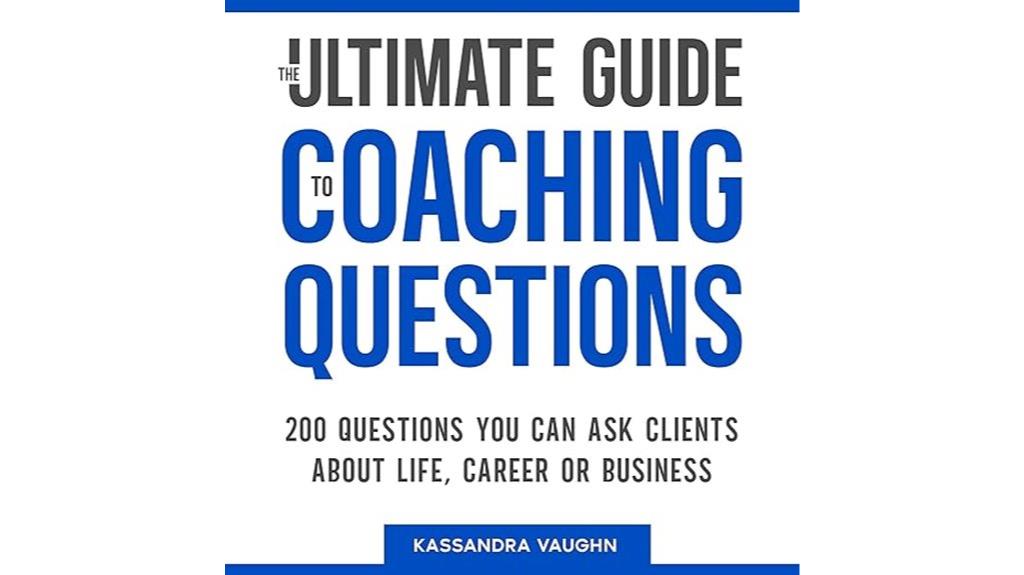
If you’re a new or aspiring coach looking to deepen your skills, “The Ultimate Guide to Coaching Questions” offers practical tools and a curated list of 200 powerful questions designed to access your clients’ potential. This concise, easy-to-understand guide is perfect for beginners and seasoned coaches alike. It emphasizes the importance of asking impactful questions to foster transformation and client engagement. The book covers different coaching styles, providing adaptable techniques and additional resources. With its straightforward approach, it’s a quick yet valuable read that builds confidence, sharpens your questioning skills, and helps you facilitate meaningful conversations in any coaching context.
Best For: aspiring and new coaches seeking practical questions, tools, and confidence to enhance their coaching sessions across business, life, or career coaching.
Pros:
- Concise and easy-to-understand, making it accessible for beginners and seasoned coaches alike
- Provides a curated list of 200 powerful questions to unlock client potential and foster transformation
- Offers adaptable coaching techniques and additional resources for continuous growth
Cons:
- Lacks detailed real-world coaching dialogue examples for deeper application insights
- Does not include the Brooke Castillo coaching model, which could enrich the content
- Could benefit from more practical application guidance and simplified concepts for diverse coaching scenarios
Do Your Best Coaching Book
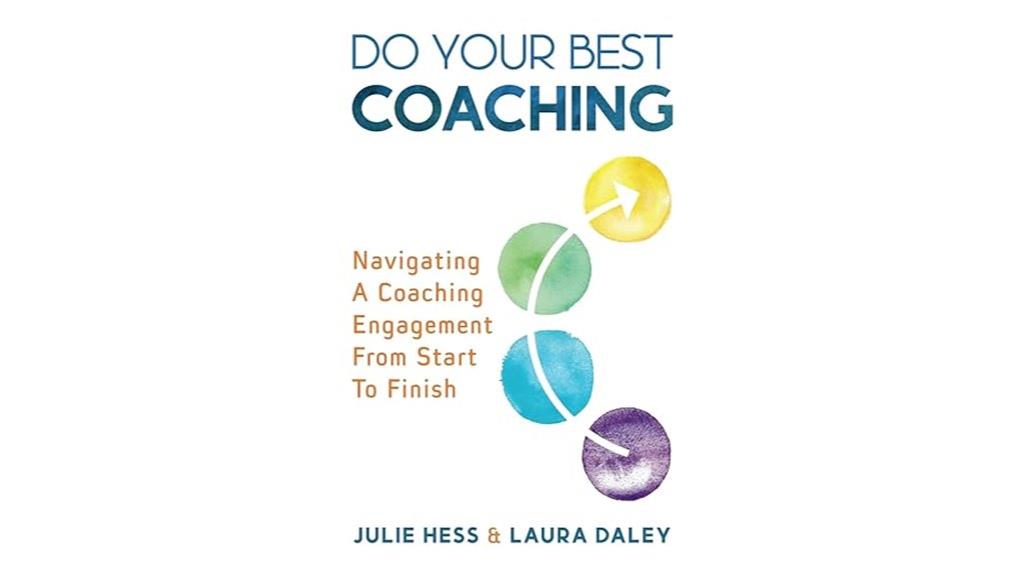
Do Your Best Coaching Book stands out as an essential resource for both new and experienced coaches seeking a thorough, practical guide to managing coaching engagements from start to finish. It offers detailed insights into building rapport, clarifying roles, and steering the four key phases of coaching, including initial meetings, ongoing sessions, and follow-up. The authors provide practical tools like checklists, sample emails, and the Intentional Coaching Framework, making it easy to deliver consistent, high-quality experiences. Rich with real-world examples, the book reinforces core coaching principles and encourages continuous learning, making it a valuable reference for anyone serious about effective, intentional coaching.
Best For: both new and experienced coaches seeking a comprehensive, practical guide to managing coaching engagements effectively from start to finish.
Pros:
- Provides detailed, real-world examples and practical tools like checklists and sample emails to support coaching practice.
- Reinforces core coaching principles and encourages ongoing professional development.
- Clear, engaging storytelling makes complex concepts accessible for coaches at all levels.
Cons:
- Some sample tools and emails may be too generic or superficial, offering limited depth.
- The Kindle version might not include full access to all detailed resources and tools.
- Focuses more on process overview rather than deep technical techniques, which might be less suitable for advanced practitioners.
Life Coaching Activities Workbook
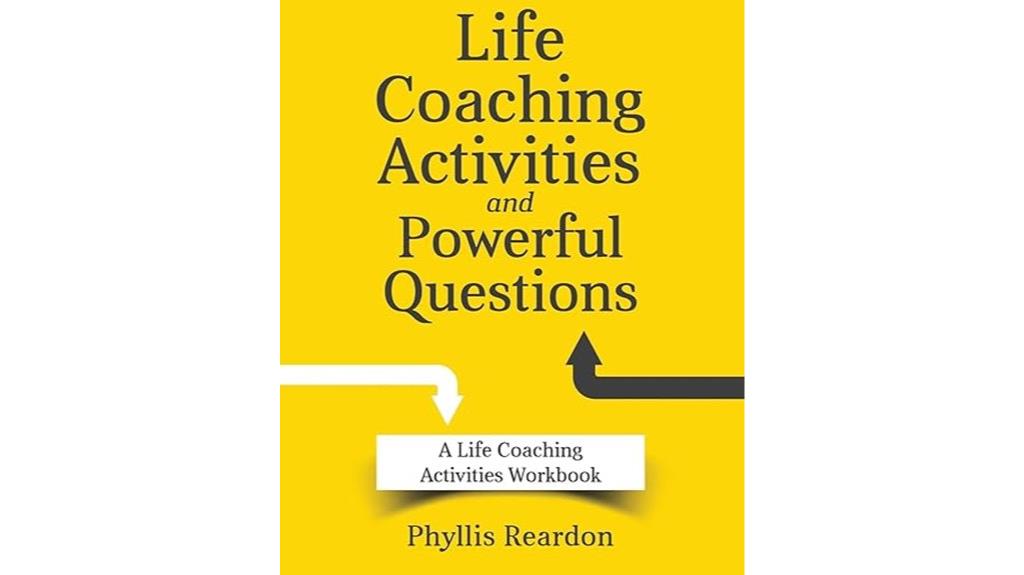
The Life Coaching Activities Workbook is an ideal resource for both aspiring and experienced coaches seeking practical tools to enhance their sessions. I find it incredibly versatile, offering engaging activities, insightful questions, and motivational quotes that promote self-awareness and growth. The workbook covers core coaching principles like visioning, goal setting, and work-life balance, making it useful for personal development or professional coaching. Its straightforward format allows me to use it as a all-encompassing guide or a quick reference. Many users, including myself, consider it an essential, repeatable resource that helps deepen coaching conversations and supports lasting change.
Best For: both aspiring and experienced coaches seeking practical, versatile tools to enhance their coaching sessions and foster personal growth.
Pros:
- Offers engaging activities, insightful questions, and motivational quotes that promote self-awareness and development.
- Covers core coaching principles like visioning, goal setting, and work-life balance in a clear, straightforward format.
- Serves as an adaptable resource for personal use or professional coaching, suitable for quick reference or comprehensive study.
Cons:
- May require additional training or knowledge for beginners to fully utilize some coaching techniques.
- The workbook’s focus on practical tools might lack deeper theoretical or psychological insights.
- Some users might find the repetitive structure limiting if seeking more advanced or specialized coaching strategies.
555 Powerful Leadership Coaching Questions
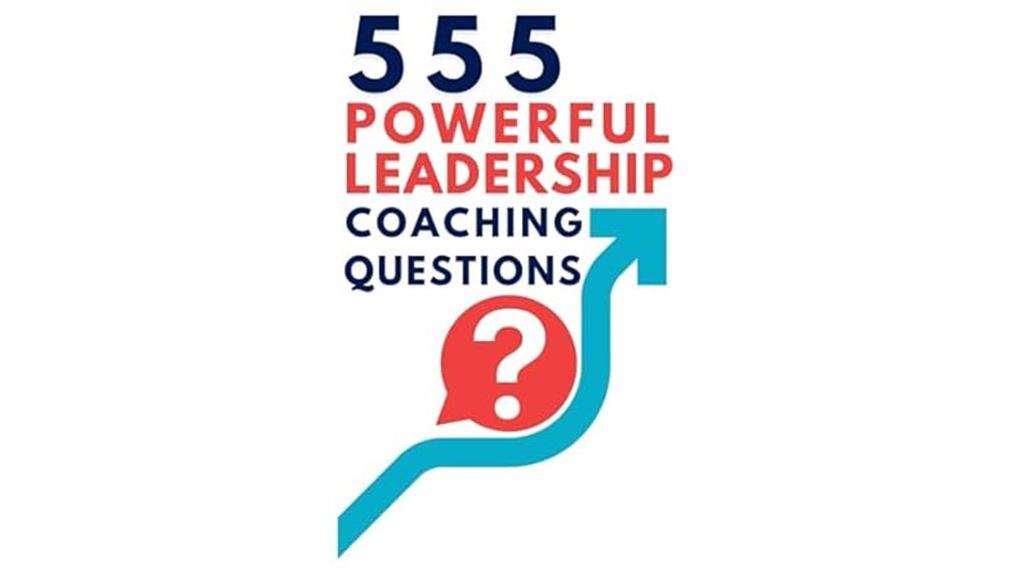
Leaders and coaches seeking to elevate their conversations will find “Powerful Leadership Coaching Questions” an indispensable resource. This book offers 555 carefully crafted questions designed to inspire growth, boost performance, and foster self-awareness. With insights into personal, social, and professional topics, it encourages deep reflection and meaningful dialogue. The inclusion of 111 follow-up questions helps explore complex issues thoroughly. Tailored for diverse teams and modern workplaces, these questions access potential, enhance emotional intelligence, and strengthen connections. Using these questions at the right moments can reveal solutions, clarify roles, and develop holistic leadership skills, making your coaching conversations far more impactful.
Best For: leaders, coaches, and HR professionals seeking to enhance their coaching conversations through thought-provoking questions that promote growth, self-awareness, and improved team dynamics.
Pros:
- Provides a comprehensive collection of 555 carefully crafted questions for diverse scenarios.
- Includes 111 follow-up questions to deepen exploration of complex topics.
- Promotes holistic leadership development by emphasizing emotional intelligence and cultural competence.
Cons:
- May require formatting adjustments for optimal readability and professionalism.
- Lacks interactive or digital components for enhanced engagement.
- Could benefit from more tailored prompts for specific industries or leadership levels.
Factors to Consider When Choosing Coaching Questions Books
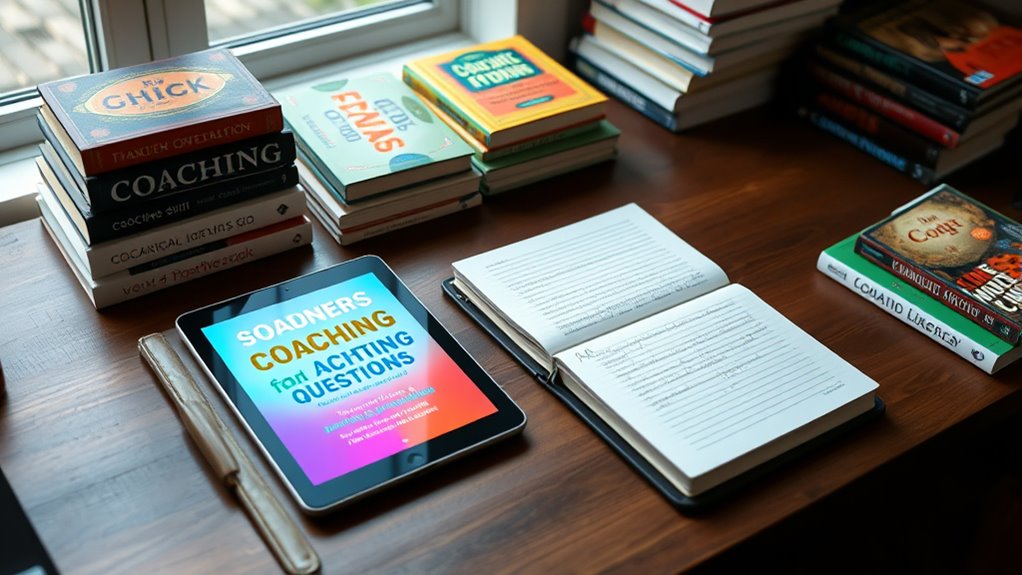
When selecting coaching questions books, I focus on how well they align with my goals and the diversity of questions they offer. It’s also important to take into account whether the book emphasizes practical application and suits my experience level. Finally, I keep cultural sensitivity in mind to make sure the questions resonate authentically with different clients.
Relevance to Goals
How do you guarantee that the coaching questions you choose truly support your specific goals? First, ensure the questions align directly with your coaching, mentoring, or leadership objectives. Look for resources that address the particular topics or challenges you encounter regularly, like team development or personal growth. It’s essential that the questions are tailored to your target audience, whether they’re executives, students, or individuals seeking self-improvement. Consider whether the questions promote the type of reflection or action you want to facilitate—be it deep insight, goal setting, or behavioral change. Finally, verify that the questions are practical and adaptable, allowing customization for different situations and client needs. This way, your coaching conversations stay relevant and impactful, always supporting your core goals.
Question Diversity Range
Have you ever wondered why some coaching conversations feel more engaging and effective than others? It often comes down to question diversity. A wide range of questions ensures applicability across different coaching styles, client needs, and contexts. Including topics like goal setting, self-awareness, accountability, and emotional intelligence helps address complex challenges. Using various formats—open-ended, reflective, probing, follow-up—keeps sessions dynamic and encourages deeper exploration. Additionally, tailoring questions to cultural, generational, and personality differences makes coaching more relevant and impactful for diverse teams. Ultimately, spanning simple to complex inquiries allows me to adapt to a client’s development level and session goals. Embracing this diversity makes conversations richer, more engaging, and ultimately more transformative.
Practical Application Focus
Choosing coaching questions that truly make a difference requires focusing on practicality. I look for books that offer ready-to-use questions tailored to real coaching scenarios, so I can apply them immediately. It’s crucial to find resources that include follow-up questions or prompts, helping deepen conversations and keep clients engaged. Organizing questions by coaching topics or stages makes it easier to find relevant prompts for specific needs or sessions. I also prioritize titles emphasizing concise, impactful questions that promote clarity and reflection without overwhelming clients. Additionally, practical tools, case examples, and exercises are invaluable—they support skill development and help me implement new techniques confidently. Overall, a practical focus ensures I can enhance my coaching conversations effectively and confidently.
Audience Level Suitability
When selecting a coaching questions book, evaluating the appropriate audience level ensures the content matches your experience and reading comfort. If you’re a beginner, look for books with straightforward language and foundational questions that build your confidence. More advanced coaches should seek resources offering complex, nuanced questions that challenge clients and deepen conversations. It’s also important to contemplate whether the questions are tailored for new or seasoned professionals, aligning with your expertise. Check if the content addresses your coaching niche—whether leadership, life coaching, or team development—to ensure relevance. Finally, verify that the tone and style match your approach, whether conversational, reflective, or strategic, so you feel engaged and can readily incorporate the questions into your practice.
Cultural Sensitivity Considerations
Selecting coaching questions books with cultural sensitivity in mind is essential for creating inclusive and effective coaching sessions. I look for resources that showcase diverse perspectives and avoid stereotypes, ensuring questions are adaptable to various cultural contexts. The best books acknowledge differences in communication styles, values, and norms, helping me foster respect and understanding. I also prioritize materials that guide me on avoiding assumptions or language that could unintentionally offend clients from different backgrounds. Incorporating insights on cultural competence allows me to navigate multicultural environments with empathy and confidence. These considerations ensure my coaching remains respectful, relevant, and impactful across diverse populations. Ultimately, choosing culturally sensitive resources helps me build trust and create a safe space for meaningful growth.
Book Format and Layout
A well-structured layout is essential for a coaching questions book, as it allows me to quickly locate the right questions for any situation. Clear headings and categories help me find relevant prompts efficiently, saving valuable coaching time. Visual aids like tables, charts, and bullet points enhance understanding and make referencing straightforward. A logical flow, such as grouping questions by coaching stages or themes, supports structured conversations and deeper exploration. Concise formatting with short, impactful questions improves readability and enables quick mental recall during dynamic sessions. Additionally, icons, color coding, or highlighted sections can improve navigation and help me distinguish different coaching areas or question types. Overall, a thoughtful layout enhances usability, making the book a practical tool for effective coaching.
Depth of Content
How deep a coaching questions book goes into different scenarios can considerably impact its usefulness. A thorough book should cover a variety of coaching situations, providing detailed explanations and context for each question. This depth helps me understand not just what to ask, but why and when to ask it, fostering more meaningful conversations. Advanced techniques and models included in well-developed books enable tackling complex coaching challenges, encouraging reflection on core values, motivations, and underlying issues. Surface-level prompts won’t drive transformation; instead, I need content that challenges me to dig deeper. A book with substantial depth supports ongoing learning and mastery, empowering me to navigate diverse scenarios confidently and effectively, ultimately enhancing my coaching skills over time.
Supplementary Resources Availability
When evaluating coaching question books, considering the availability of supplementary resources can make a significant difference in how effectively I can apply what I learn. Many books offer downloadable question prompts, printable worksheets, or online toolkits that help translate concepts into practice. Additional digital content like videos, podcasts, or interactive modules can deepen my understanding and engagement. Some books grant access to online communities or forums, allowing me to discuss questions, share insights, and get feedback. These resources often include case studies, real-life coaching scenarios, or guided exercises that reinforce learning. The quality and accessibility of these extras can greatly enhance the book’s usefulness, making it adaptable to various coaching situations and helping me implement strategies with greater confidence.
Frequently Asked Questions
How Do Coaching Questions Differ Across Various Industries?
Coaching questions vary across industries because each field has unique challenges and goals. I’ve noticed that in healthcare, questions focus on patient outcomes and empathy, while in business, they emphasize strategy and growth. I adapt my approach depending on the industry, asking targeted questions to inspire reflection and action. Understanding the context allows me to craft questions that truly resonate and drive meaningful conversations tailored to each industry’s needs.
What Are Common Pitfalls When Applying Coaching Questions?
Pitfalls in applying coaching questions often cause confusion and compromise clarity. I’ve found that rushing responses, repeating questions, or asking overly complex questions can derail dialogue. It’s vital to listen, learn, and leverage open-ended questions thoughtfully. When I stay patient and purposeful, my coaching conversations become more productive and powerful. Avoid these pitfalls, and you’ll foster genuine growth and meaningful breakthroughs in every conversation.
How Can I Tailor Questions for Different Personality Types?
When tailoring questions for different personality types, I start by understanding their communication style and preferences. For example, I ask open-ended questions with introspective tones for reflective personalities, while I use direct, goal-oriented questions for task-focused individuals. I pay attention to their responses and adjust my approach accordingly. This personalized method helps me foster trust, encourage honest dialogue, and access deeper insights tailored to each person’s unique personality.
What Metrics Evaluate the Effectiveness of Coaching Questions?
Some might think measuring coaching questions is tricky, but I believe clear metrics can really show their influence. I look at client engagement, the depth of insights gained, and whether goals are being advanced. Feedback and self-reflection are essential too. These measures help me see if my questions foster growth and clarity, ultimately transforming conversations into powerful tools for change.
How Do Cultural Differences Influence Coaching Question Strategies?
Cultural differences profoundly influence coaching question strategies because what resonates in one culture may not in another. I adapt my questions to respect cultural norms, communication styles, and values. For example, direct questions might work well in some cultures but could feel intrusive elsewhere. By being culturally aware, I guarantee my questions foster trust, understanding, and meaningful dialogue, ultimately making my coaching more effective across diverse backgrounds.
Conclusion
Did you know that asking the right questions can boost team engagement by up to 60%? Exploring these top coaching books has shown me how powerful thoughtful questions can be in transforming conversations. Whether you’re leading, mentoring, or coaching, these resources offer invaluable insights. I encourage you to pick one and start asking more impactful questions today—it’s a simple step that can truly change your conversations and your leadership style.

